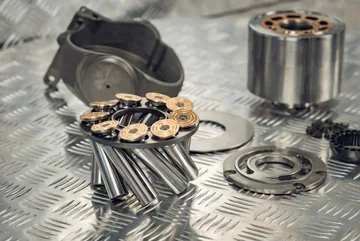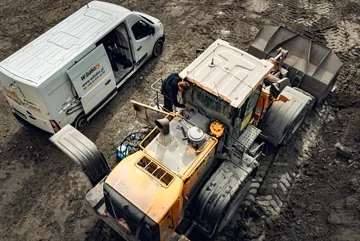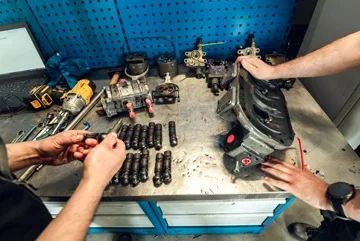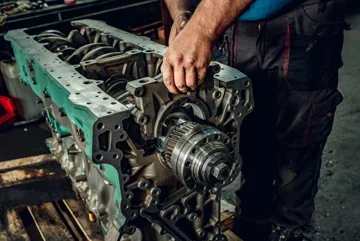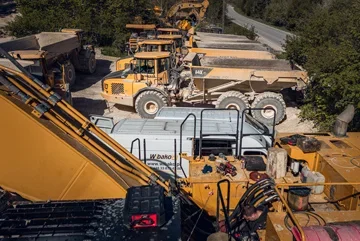Overview of the most common faults
Construction machinery, like any other mechanical equipment, eventually breaks down. However, it is worth knowing that the daily operation of the machine has a significant impact on the frequency and cost of faults.
Operators, in the rush of work, unfortunately do not always pay attention to whether the machine is in good condition, and meanwhile even minor neglect can result in serious machine problems in the future.

Morning machine review
It is worth insisting that the operator conducts a basic inspection of the machine's condition every day before starting work. He should pay particular attention to any leaks and mechanical damage. The sooner they are noticed, the cheaper and less troublesome the repair usually is.
The norm for machines with central lubrication systems are faults of this system, which is usually affected by insufficient attention to daily inspections. The same is true for machines without automatic lubrication, where the operating error is to allow a situation in which mechanical elements without lubrication simply seize up.
Another common oversight is the lack of control over the level of coolant. Too low a level of this fluid leads to cooling system failures.
Unfortunately, it still happens that operators even ignore computer indications, and even block the operation of the fluid level sensor.
A regularly recurring operating error is also a lack of care for the filters in the hydraulic and drive system - too infrequent replacement.
Prevention is better than cure
It's no secret that the most common failures in construction machinery concern the hydraulic system. However, spontaneous and unreported failures are very rare. Usually, the problem is preceded by leaks, which are easy to locate - it only takes a few minutes a day.
Meanwhile, operators commonly ignore this, and only report a failure when they hear knocks or feel jolts. By then, it is usually too late for immediate help.

Evident mistakes
Operators of construction machinery often try to take care of their service themselves and this is not a bad thing, as long as the problem does not exceed their competence.
Meanwhile, it happens that operators undertake so-called "amateur repairs", and even very complicated tasks, such as adjusting the hydraulic pump. This can lead to serious consequences, including a costly repair failure.
A fairly common mistake is also pouring hydraulic oil into the engine, and even into the fuel tank.
Therefore, before handing over the machine to the operator, it is really worth conducting a detailed instruction. The operator should be sensitized to always top up the hydraulic system with the same oil that is already in the system. A good practice is to write down the oil parameters and place them in a visible place in the cabin.
Remember that changing the hydraulic oil yourself is risky and rarely proves effective on a construction site. A professional service ensures that the old oil is flushed out of the entire system. Only then can we be sure that 100% fresh oil is working in the system.

What else is worth remembering?
Finally, let's mention taking care of the cleanliness of the machine, especially when working in conditions of high dust. Regular washing of the machine allows you to see more, and this makes it easier to locate leaks and other faults.













